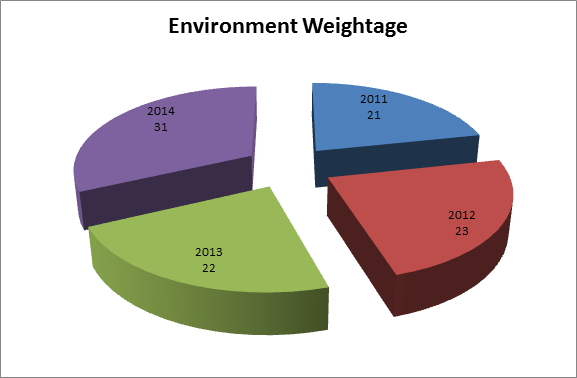ENVIRONMENT STRATEGY
With the change in format since 2011, UPSC is constantly giving more weightage to ‘Environment Section’. There can be various reasons to it from inclusion of Indian Forest Services (IFoS) to increasing worldwide environmental concern.
Weightage given since 2011:
The importance of Environment can be seen from the fact that it constitutes around 25-30 percent of the general studies, paper 1. Skip this at your own risk.

How to Prepare
There are many books and coaching notes in the market but seeing the dynamic and unpredictable nature of the subject, there is no concrete material available. Considering this many aspirants find it difficult to prepare and lose substantially in Prelims. It is very important to know the basics from the NCERT texts or any book, but is that sufficient?
In this article we are going to deal with following aspects without detailing the syllabus. Many aspirants start on a higher note but without knowing the need or essence, they get stuck in between and lose energy. This costs them severely and the vicious cycle of preparation goes on.
Let us address the issues going to be covered
What to read?
- The most important aspect of preparation is sources and resources that build your confidence as well as chances.
- Basic texts like NCERT’s- Geography from 6th and 12th and Biology, 12th (Old and New)
- You can also refer to ICSE books – Class 10th and 11th
- The Hindu, Down to Earth and Science Reporter
Keep this in mind while preparing for Environment
- A simple approach for environment related topics is a mix of static and dynamic portion.
- Here we will not tell you to exhaustively cover everything on earth but to simply relate and learn in a smarter way.
- While going through the article, you will know how to pick issues from newspapers and relate it to static portion.
- It is to make your life easy. Make sure that your preparation is as easy as it could be. There is nothing to panic in life. At least environment section should not panic you after going through this. 🙂
How to pick issues?
- It is explained later in this article.
- The purpose of this article is to make you understand the diverse nature of this section and how it can be fine tuned with right approach.
- We have not explained elaborately on what topics are important or what not (unlike the Core subjects like Polity, Geography, Economics, History) as this section needs a strategy different from the Core subjects. If we tell you to focus only on certain aspects, then you will be taken for a ride. So, what we have done is, we have chalked out a path, for you to make the right choices and cover this section smartly.
Note: In almost every book one can find the syllabus and aspects related to Environment. We will not indulge into it rather concentrate broadly on how to tackle the questions and chalk out relevant issues to be prepared.
Broadly UPCS questions are based on following front. We will take examples from previous year papers and then pick relevant issues from newspapers to understand the nuances of preparing ‘Environment’.
Topics range from:
- General issues on Environmental Ecology– ecological terms like Ecotone, Ecological niche ecosystem, effects of environmental deterioration, how it affects human being. Food chain in the ecosystem.
- Pollution – Acid rain, Photochemical smog, Green House Gases (GHG’s), Ozone hole, algal bloom.
- Bio-diversity (which also overlaps with topics from Geography)- why biodiversity is important for human survival, International Union for Conservation of Nature and Natural Resources (IUCN) – Red Data Book, Biodiversity Hotspots.
- Conservation- Conservation of natural resources, National Parks, Wildlife conservations, Wetlands, Biosphere Reserves etc. – internationally recognized Wetlands and Biosphere Reserves of India.
- Sustainable Development– renewable energy, Biotechnology (bio-fertilizers, bio-pesticides), Biomass gasification.
- Ecologically sensitive areas – Western Ghats, Himalayas.
- Climate Change – mitigation measures taken at national and international level (Kyoto protocol, Montreal protocol) recent climate change summits held, objectives of the summits.
- Laws, Regulatory Bodies and Policies at national and international level: Environment Protection Act, Forest Right Act, National Biodiversity Authority, Protocols and Summits like Cartanega Protocol, Nagoya Protocol and Lima Conference etc.
- Intergovernmental Organizations, Treaties and Conventions related to climate change, biodiversity- Ramsar Convention, Montreux Record, The three Rio Conventions—Convention on Biological Diversity(CoB), United Nations Framework Convention on Climate Change (UNFCCC) and United Nations Convention to Combat Desertification – from the 1992 Earth Summit) etc.
- Organisations like UNEP, FAO, UNESCO etc.
Note: Google for the latest updates on the recent treaties and updates taken at the national and international level with regard to Climate Change, Conservation and Biodiversity
Use ‘Orient BlackSwan School Atlas’- Page No. 35 for finding the location of the Conservation sites, rivers flowing near-by, hills. Since, atleast 2 questions are frequently asked every year in the Prelims Exam.
Consider an example from 2014 question paper
| Consider the following pairs1. Dampa Tiger Reserve : Mizoram
2. Gumti Wildlife Sanctuary : Sikkim
3. Saramati Peak : Nagaland
Which of the above pairs is /are correctly matched?
A. 1 only
B. 2 and 3 only
C. 1 and 3 only
D. 1, 2 and 3
Solution: C |
Continue to read



